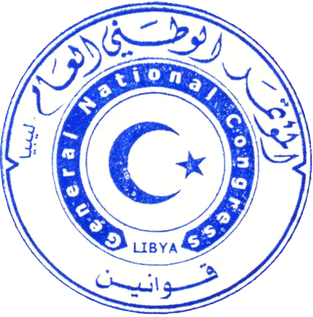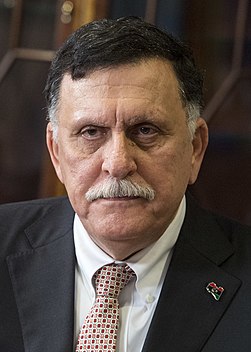Related Research Articles

Libya, officially the State of Libya, is a country in the Maghreb region in North Africa, bordered by the Mediterranean Sea to the north, Egypt to the east, Sudan to the southeast, Chad to the south, Niger to the southwest, Algeria to the west, and Tunisia to the northwest. The sovereign state is made of three historical regions: Tripolitania, Fezzan and Cyrenaica. With an area of almost 1.8 million square kilometres (700,000 sq mi), Libya is the fourth largest country in Africa, and is the 16th largest country in the world. Libya has the 10th-largest proven oil reserves of any country in the world. The largest city and capital, Tripoli, is located in western Libya and contains over one million of Libya's six million people. The second-largest city is Benghazi, which is located in eastern Libya. The Latin name Libya is based on the name the region west of the Nile (Λιβύη) used by the Ancient Greeks and Romans for all of North Africa, and was first adopted during the Italian colonization since 1911.

The Politics of Libya is in an uncertain state due to the collapse of the Libyan Arab Jamahiriya in 2011 and an ongoing civil war between the House of Representatives in Tobruk and its supporters, the New General National Congress in Tripoli and its supporters, and various jihadists and tribal elements controlling parts of the country.

Field Marshal Khalifa Belqasim Haftar is a dual Libyan-American citizen who is the Commander of the Libyan National Army (LNA), which, under Haftar's leadership, replaced nine elected municipal councils by military administrators, and as of May 2019, was engaged in the Second Libyan Civil War. On 2 March 2015, he was appointed commander of the armed forces loyal to the elected legislative body, the Libyan House of Representatives.

Since the end of the 2011 Libyan Civil War, which overthrew Muammar Gaddafi, there has been violence involving various militias and the new state security forces. The violence has escalated into the current 2014 Libyan Civil War.
The Libyan Armed Forces are, in principle, the state organisation responsible for the military defence of Libya, including ground, air and naval forces.

The Libyan Army is the land warfare branch of the military of Libya, which since December 2015 has been nominally subordinated to the internationally recognised Government of National Accord (GNA) based in Tripoli. Due to the instability in the country in 2011 civil war and the outbreak of a new conflict in 2014, the Libyan ground forces remain highly divided, with major components constituting the Libyan National Army (LNA) under the command of Khalifa Haftar. The forces loyal to the GNA have been fighting against various other factions in Libya, as well as terrorists groups like the Islamic State. Some efforts have been made to create a truly national army, but most of the forces under the Tripoli government's command consist of various militia groups, such as the Tripoli Protection Force, and local factions from cities like Misrata and Zintan.
The Libyan National Army, known since November 2019 by the United Nations Panel of Experts on Libya under UNSC Resolution 1973 as the Haftar Armed Forces or HAF, and also known as the Libyan Arab Armed Forces or LAAF since late 2019, is a component of Libya's military forces, which were nominally a unified national force under the command of Khalifa Haftar when he was nominated to the role on 2 March 2015 by the House of Representatives, consisting at the time of a ground force, an air force and a navy.

The General National Congress or General National Council was the legislative authority of Libya for two years following the end of the First Libyan Civil War. It was elected by popular vote on 7 July 2012, and took power from the National Transitional Council on 8 August.

The Second Libyan Civil War is an ongoing conflict among rival factions seeking control of Libya. After erupting in 2014, the conflict is mostly between :

The House of Representatives (HoR) is the monocameral parliament of Libya. Islamists were defeated at the 2014 Libyan parliamentary election and rejected the results, which saw only an 18% turnout. In late 2014, following the occupation of Tripoli by armed islamist groups during the Libyan Civil War, the House of Representatives relocated to Tobruk in the far east of the country. As of 2019, during the Libyan Civil War, it is generally called the "Tobruk government". Several HoR sessions were held in Tripoli in May 2019, electing an Interim Speaker for 45 days.

The National Salvation Government was a government body formed by politicians from the General National Congress's blocs that lost the June 2014 elections in Libya. The NSG was led by Khalifa al-Ghawil. The term Libya Dawn Coalition was used to refer to the armed groups and/or the wider political movement supporting the NSG. The NSG was one of the major sides in the ongoing Second Libyan Civil War from its formation August 2014 until its dissolution in April 2016.

The Libyan Crisis refers to the ongoing conflicts in Libya, beginning with the Arab Spring protests of 2011, which led to a civil war, foreign military intervention, and the ousting and death of Muammar Gaddafi. The civil war's aftermath and proliferation of armed groups led to violence and instability across the country, which erupted into renewed civil war in 2014. The ongoing crisis in Libya has so far resulted in tens of thousands of casualties since the onset of violence in early 2011. During both civil wars, the output of Libya's economically crucial oil industry collapsed to a small fraction of its usual level, with most facilities blockaded or damaged by rival groups, despite having the largest oil reserves of any African country. U.S. President Barack Obama stated on 11 April 2016 that not preparing for a post-Gaddafi Libya was probably the "worst mistake" of his presidency.
Khalifa al-Ghawil, sometimes transliterated as Khalifa al-Ghweil or Ghwell, is a Libyan politician. He was the prime minister of the General National Congress-led National Salvation Government in Tripoli.

Fayez Mustafa al-Sarraj is the Chairman of the Presidential Council of Libya and prime minister of the Government of National Accord (GNA) of Libya, formed on 17 December 2015 under the Libyan Political Agreement. He has been a member of the Parliament of Tripoli.

The Government of National Accord is an interim government for Libya that was formed under the terms of the Libyan Political Agreement, a United Nations-led initiative, signed on 17 December 2015. The agreement was unanimously endorsed by the United Nations Security Council, which welcomed the formation of a Presidency Council for Libya and recognized the Government of National Accord as the sole legitimate executive authority in Libya. On 31 December 2015, Chairman of the Libyan House of Representatives, Aguila Saleh Issa declared his support for the Libyan Political Agreement. During 2015–2017, the General National Congress criticized the unity government on multiple fronts as biased in favor of its rivals, the House of Representatives.

The Presidential Council of Libya is a body formed under the terms of the Libyan Political Agreement which was signed on 17 December 2015. The Council carries out the functions of head of state of Libya and is to take command of the Libyan National Army. The agreement has been unanimously endorsed by the United Nations Security Council which welcomed the formation of the Presidency Council and recognized that the Government of National Accord is the sole legitimate executive government of Libya. The Presidential Council presides over the Government of National Accord.
This is a detailed timeline of the Second Libyan Civil War (2014–present).
Clashes have been ongoing in West Libya since 14 October 2016. A coup d'état attempt was conducted by the former head of the National Salvation Government Khalifa al-Ghawil against Prime Minister Fayez al-Sarraj, the head of Libya's GNA Government.

The Next Libyan general election was planned to be held in Libya in early 2019, after having earlier been planned for 10 December 2018. The elections are intended to consist of presidential and parliamentary elections.

The Western Libya offensive, code-named Operation Flood of Dignity, is a military campaign by the Libyan National Army under Field Marshal Khalifa Haftar, which represents the Libyan House of Representatives, to capture the western region of Libya and eventually the capital Tripoli held by the UN Security Council-recognised Government of National Accord.
References
- ↑ Libya gets 'Presidential Guard'. News24. Published 10 May 2016.
- ↑ Interview: Libyan general requests UNSC to exclude Libyan Presidential Guard from arms embargo. Xinhua. Published 19 June 2017.
- ↑ Libya’s Presidential Guard Kicked Out of Tripoli Positions. The Libya Times. Published 26 May 2018.
- ↑ Hanly, Ken (1 September 2016). Commanders of the Libyan Presidential Guard appointed. Digital Journal.
- ↑ Libya’s acting PM replaces presidential guard commander. Anadolu Agency. Published 24 October 2018.
- ↑ Chair of PC appoints new commander for Presidential Guard. Libya Observer. Published 25 October 2018.